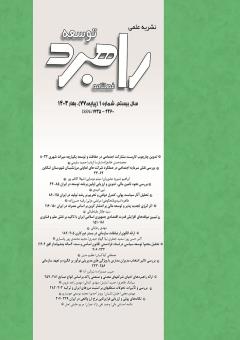تبیین مولفههای افزایش قدرت اقتصادی جمهوری اسلامی ایران با تاکید بر نقش علم و فناوری
محورهای موضوعی :
1 - دانشجوی دکتری علوم اقتصادی (گرایش اقتصاد اسلامی)، پژوهشکده علوم اجتماعی، پژوهشگاه حوزه و دانشگاه، قم، ایران
کلید واژه: واژگان کلیدی: قدرت اقتصادی, علم و فناوری, اقتصاد دانشبنیان, جمهوری اسلامی ایران,
چکیده مقاله :
نقش دانش در رسیدن به رشد اقتصادی قابل انکار نیست و وابستگی کشور به دانش بیگانگان، از موانع اصلی در زمینه تحقق اقتصاد قدرتمند به شمار می¬رود. چرا که قدرتسازی اقتصادی در هر عصری و در هر کشوری به توان علمی و فناورانه آن جامعه بستگی دارد. لذا به مقداری که کشور بتواند به فناوریهای جدید دست یابد، خواهد توانست قدرت اقتصادی و به تبع قدرت نظامی و سیاسی خود را افزایش دهد. البته توجه به فناوری باید با محوریت کاربردیسازی و در جهت استحکام و تقویت قدرت اقتصادی جمهوری اسلامی باشد، از اینرو پژوهش حاضر به دنبال تبیین سازوکار حاکم بر اقتصاد و فناوری به نحوی است که زمینه افزایش قدرت اقتصادی را فراهم نماید. مبتنی بر این رویکرد، ویژگی¬ها و مولفه¬های اصلی ایجاد و افزایش قدرت اقتصادی با تاکید بر نقش علم و فناوری بیان می¬گردد. نتایج پژوهش که با روش توصیفی تحلیلی و با استفاده از منابع کتابخانهای، تحلیل اسنادی و نیز تحقیق و توسعه بهدستآمدهاند، بیانگر این مسئله است که عناصری مانند نظام اقتصادی موزائیکی، خط تولید کارگاهی، اتخاذ رویکرد افزایش شدت دانش، تزریق دانش در تمامی ابعاد تولید، توزیع و مصرف، درون¬زایی تولید علم و فناوری و ایجاد زیستبوم مبتنی بر دانش از جمله مهمترین این عوامل هستند.
The role of knowledge in achieving economic growth cannot be denied, and the country's dependence on the knowledge of foreigners is one of the main obstacles in the field of realizing a strong economy. Because economic empowerment in every era and in every country is dependent on the scientific and technological power of that society. Therefore, to the extent that the country can access new technologies, it will be able to increase its position of economic power and, consequently, its military and political power. Of course, technology should be used in a practical way to strengthen the economic power of the Islamic Republic of Iran. This research seeks to explain the mechanism governing the economy and technology in a way that provides the basis for increasing economic power. Therefore, based on this approach, the main features and components of creating and increasing economic power are expressed with emphasis on the role of science and technology. The results of the research, which were obtained by descriptive analytical method and using library resources, document analysis and research and development, indicate that elements such as mosaic economic system, workshop production line, adopting the approach of increasing the intensity of knowledge, injecting knowledge in all dimensions Production, distribution and consumption, endogeneity of science and technology production and creation of knowledge-based ecosystem are among the most important of these factors.
منابع
- بیانات نوروزی مقام معظم رهبری در حرم رضوی، ١٣٩۴
- اسکندری، محمدحسین (1381). کالبد شناسی مفهوم قدرت، فصلنامه روششناسی علوم انسانی، ۸ (30)، 35-61.
- باقری، مسلم؛ علیشیری، محمدمهدی و سیامک طهماسبی (1393). طراحی نظام مدیریت مبتنی بر نتایجِ زمینهساز الگوی اسلامی- ایرانی پیشرفت، فصلنامه صدرا، ۴ (10)، 229-239.
- سیف، الهمراد (1389)، برآورد راهبردی قدرت اقتصادی آمریکا، فصلنامه آفاق امنیت، ۳ (۸)، 47-76.
- سیف، الهمراد (1390). مفهومشناسی قدرت نرم اقتصادی جمهوری اسلامی ایران، فصلنامه آفاق امنیت، ۴ (۱۱)، 5-38.
- سیف، الهمراد؛ افتخاری، اصغر؛ عزتی، مرتضی و محمدتقی رمضانی (1392)، مفهوم شناسی قدرت نرم اقتصادی توسعه نظریه قدرت نرم متعارف در حوزه اقتصاد، مطالعات راهبردی بسیج، ۱۵ (۶۰)، 5-36.
- اللهیاری فرد، نجف و عباسی، رسول (1390). بررسى الگوى مناسب ساختار سازمانى شركتهاى دانشبنیان، رشد فناوری، ۸ (۲۹)، 47-54.
- محمدی، میلاد (1394). کلید اقتصاد دانشبنیان، ماهنامه اقتصاد دانشبنیان، ۱ (۱)، 36-40.
- میرمعزی، سیدحسین (۱۳۹۱). اقتصاد مقاومتی و ملزومات آن، فصلنامه اقتصاد اسلامی، ۱۲ (۴۷)، ۴۹-۷۶.
- موسوی شفایی و ایمانی (1396). دیپلماسی اقتصادی؛ رهیافتی برای افزایش قدرت ملی ایران، فصلنامه راهبرد، ۲۶ (۸۴)، 149-174.
- نریمانی، میثم و عسکری، حسین (1391). چارچوب مفهومی اقتصاد مقاومتی، اولین همایش ملی اقتصاد مقاومتی، تهران: دانشگاه علم و صنعت.
- نیازی، علی (1388). مقابله زیگزاگی با دشمن فرامنطقه¬ای در جنگ ناهمتراز، فصلنامه علوم و فنون نظامی، ۶ (۱۴)، ۲۲-۴۴.
- نوروزی چاكلی، عبدالرضا و مددی، زهرا (1394). تاثیر قدرت اقتصادی بر جایگاه علم و فناوری کشورها و تحلیل رابطه متقابل آنها، پژوهش نامه علم سنجی، ۱ (۲)، 1-14.
- Burkitt (1980). The Sources of Economic Power, International Journal of Social Economics, 7 (3), 122-131.
- Foucault, Michael; Dreyfus, Hubert L.; Rabinow, Paul (1983). Beyond Structuralism and Hermeneutics, University of Chicago Press.
- Laffaye, Sebastián; Lavopa, Federico & Llana, Cecilia Pérez (2013). Changes in the global economic power structure: towards a multipolar world?, Argentine Journal of International Economics, 1 (1).
- Low, Soo Wah; Tze Tee, Lain; Kew, Si Roe and Ghazali, Noor (2015). The Link Between Financial Development and Knowledge-Based Economy - Evidence from Emerging Markets, Journal of Economic Cooperation and Development, 36 (10), 51-88.
- OECD (1996). The Knowledge-Based Economy, Paris: Organisation for Economic Co-Operation and Development.
- Poladian, Simona and Monica, Iulia (2013). Emerging of new poles of economic power in the world, 1st International Conference 'Economic Scientific Research - Theoretical, Empirical and Practical Approaches', ESPERA, 474-483.
- Prendergast, Renee (2010). Accumulation of knowledge and accumulation of capital in early theories of growth and development, Cambridge Journal of Economics, 34, 413-431.
- Rodríguez, José Carlos (2007). Large And Small Firms’ Role in the Knowledge based Industries Innovation Process, Revista Nicolaita de Estudios Económicos, 2 (1), 131-143.
- Sharma, Sushil K. and Gupta, Jatinder N.D. (2004). Knowledge, Economy and Intelligent Enterprises: Intelligent Enterprises of the 21st century, Idea Group Publishing.
- Strange, Susan (1980). What Is Economic Power, and Who Has It? , International Journal, 30 ( 2), Force and Power, 207-224.
- Whalley, John (2009). Shifting Economic Power, Centre for International of Governance Innovation and CESifo Munich, Germany.

